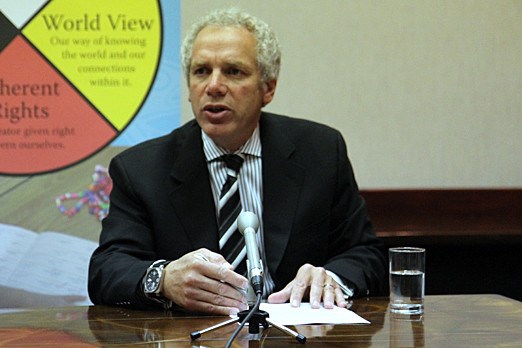Officials with the Nishnawbe Aski Nation have called on the province to conduct an inquiry into the deaths of seven First Nation youths who died while attending school in Thunder Bay.
NAN Deputy Grand Chief Terry Waboose made the announcement at a news conference at the Victoria Inn Monday morning. The call for the inquiry follows last week’s ruling by coroner Dr. David Eden, who found that the inquests into the death of 15-year-old Reggie Bushie couldn’t proceed until the First Nations people were properly represented on the Ontario jury roll.
His findings stated the 2011 jury roll for the Judicial District of Thunder Bay is not representative of the community and does not comply with the Juries Act.
The requested inquiry would look into the deaths of Reggie, 17-year-old Kyle Morriseau, 15-year-old Jordan Wabasse, 15-year-old Jethro Anderson, 18-year-old Curran Strang, Paul Panacheese and Robyn Harper.
Waboose said Ontario needed to look at the cases collectively and not on an individual basis. By looking at the cases collectively, the province could get the whole story behind the deaths of these seven youths.
He added that all seven died under similar circumstances, but the reasons behind that pattern haven’t’ been answered.
“The (inquiry) will have a scope that’s much larger where we`ll be able to examine and look at evidence involving more people that may have the answers as to the circumstances to why these young people have perished,” Waboose said.
“Some kind of processes has to be convened as soon as possible because we have families back there that deserve and are owed an explanation and the reasons why their kids have perished. They need closure.
“NAN is only one party. We cannot do this ourselves. We need to involve all those parties to ensure that we can find answers.”
Julian Falconer, an attorney representing NAN, said there are limitations to the inquest system and the Commission of Inquiry wouldn’t have those same limitations.
He said they could no longer be satisfied that the deaths were coincidences of circumstances.
“How many more have to die before we all can acknowledge there’s a disturbing pattern here?” Falconer asked.
“No one can presume anything. I certainly don’t. I’m just troubled by the number of deaths. To be honest when one is looking at the Thunder Bay Police Service, one has to accept that there is a history, no matter which police service we’re talking about, of tunnel vision in some cases.
“There is a history of stereotyping in some cases that police fall victim to. Did that happen in this case? We don’t know but we worry.”
Falconer said a commissioner would be able to look at each of the individual cases and give a broad scoping report on all causes of deaths.
“A jury could hear evidence for a year but the law says they can’t give a narrative of how the person died,” he said.
“A commissioner of an inquiry is entitled and is part of his job to provide a full report on the circumstances of each death including a narrative of what happened. The justice system is incapable of looking into these seven deaths in any meaningful way.”
But there’s more than just the initial investigation.
If properly run, the inquiry will provide counsel for those involved and allow the families to participate, which isn’t available to those during an inquest.
Sign in or register
- Messages
- Post a Listing
- Your Listings
- Your Profile
- Your Subscriptions
- Your Likes
- Your Business
- Support Local News
- Payment History
Registered Users
Already have an account?
New Users
Create a free account.
